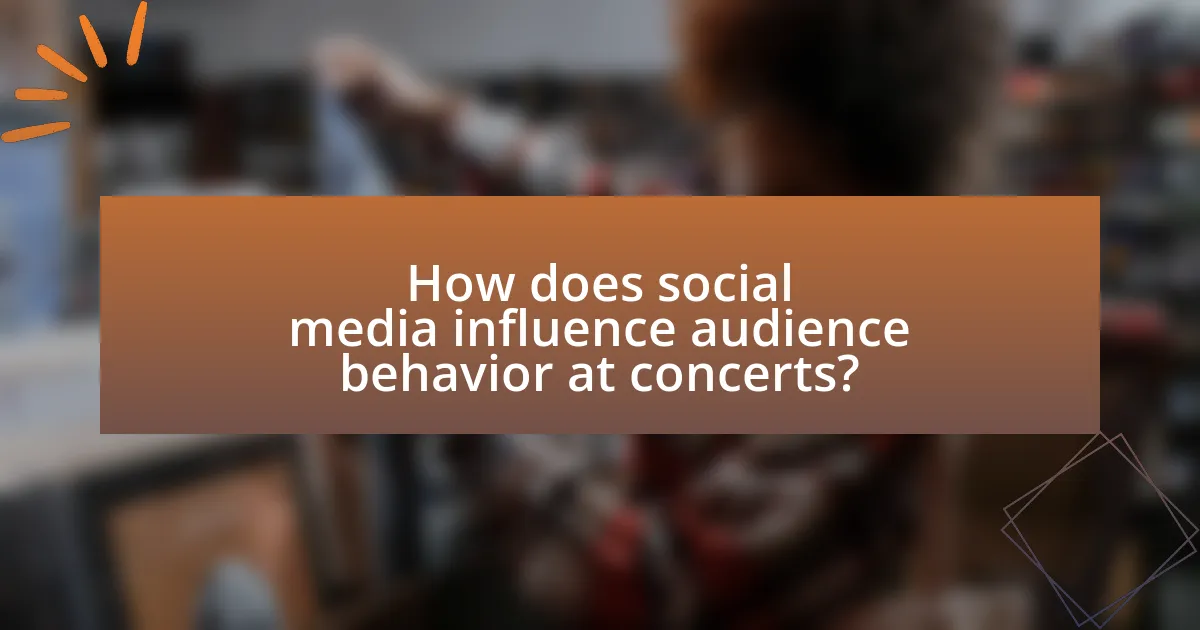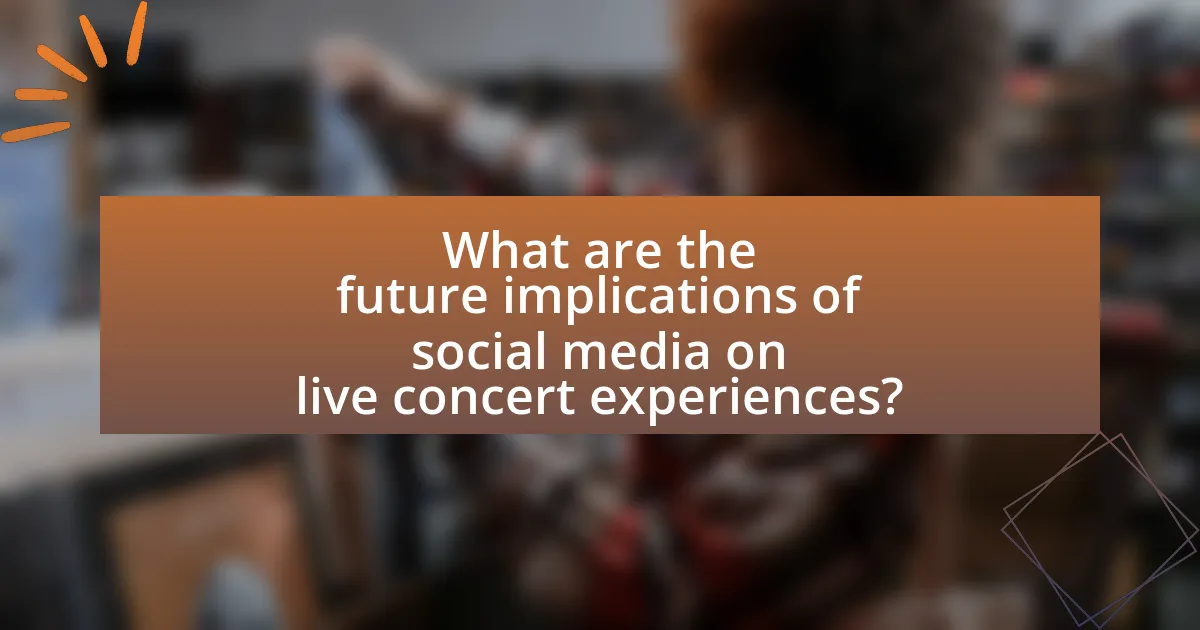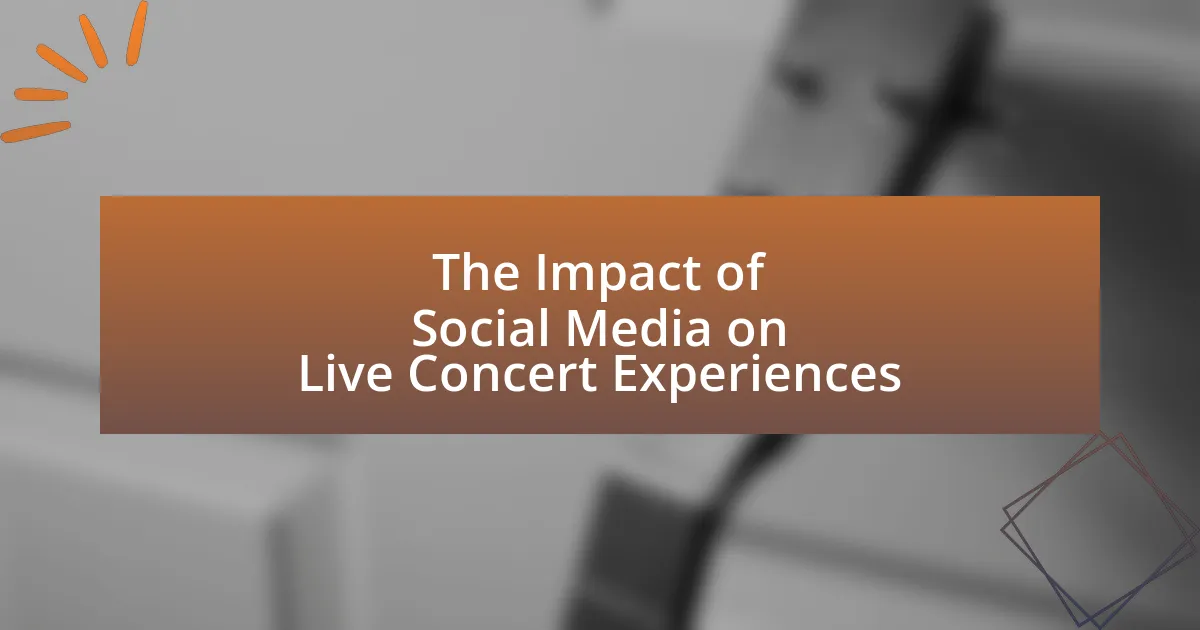The article examines the impact of social media on live concert experiences, highlighting its role in enhancing audience engagement and broadening reach. It discusses how platforms like Instagram and Twitter facilitate real-time sharing, allowing fans to connect and create a sense of community during events. The article also explores the influence of social media on concert promotion, ticket sales, and audience behavior, while addressing both positive and negative effects, such as distractions and altered perceptions of live events. Additionally, it considers future implications and emerging technologies that may further shape the relationship between social media and live concerts.

What is the Impact of Social Media on Live Concert Experiences?
Social media significantly enhances live concert experiences by facilitating real-time engagement and broadening audience reach. Platforms like Instagram and Twitter allow fans to share live updates, photos, and videos, creating a sense of community and excitement around events. According to a study by Eventbrite, 80% of concertgoers share their experiences on social media, which not only amplifies the event’s visibility but also influences ticket sales and artist popularity. This interconnectedness fosters a shared experience, as attendees can interact with each other and the performers, enhancing the overall enjoyment and emotional connection to the concert.
How has social media changed the way fans experience live concerts?
Social media has transformed the way fans experience live concerts by enabling real-time sharing and interaction. Fans can now post live updates, photos, and videos during performances, creating a shared experience that extends beyond the physical venue. This immediate engagement allows fans to connect with others globally, fostering a sense of community and enhancing the overall concert experience. According to a study by Eventbrite, 80% of concertgoers share their experiences on social media, indicating that this platform significantly influences how fans perceive and engage with live events.
What role does social media play in concert promotion and ticket sales?
Social media plays a crucial role in concert promotion and ticket sales by providing platforms for artists and promoters to reach large audiences quickly and effectively. Through targeted advertising, engaging content, and direct interaction with fans, social media enables real-time updates about concert details, ticket availability, and promotional offers. For instance, a study by Eventbrite found that 93% of event organizers use social media to promote their events, highlighting its significance in driving ticket sales. Additionally, platforms like Facebook and Instagram allow for the sharing of user-generated content, which can enhance visibility and create a sense of community around events, further boosting ticket sales.
How do social media platforms enhance fan engagement during concerts?
Social media platforms enhance fan engagement during concerts by facilitating real-time interaction and content sharing among attendees and artists. These platforms allow fans to post live updates, photos, and videos, creating a shared experience that amplifies the concert atmosphere. For instance, a study by Eventbrite found that 80% of concertgoers share their experiences on social media, which not only increases visibility for the event but also fosters a sense of community among fans. Additionally, artists can engage directly with their audience through live streams, Q&A sessions, and behind-the-scenes content, further strengthening the connection between performers and fans.
What are the positive effects of social media on live concert experiences?
Social media enhances live concert experiences by increasing audience engagement and broadening reach. Platforms like Instagram and Twitter allow fans to share real-time updates, photos, and videos, creating a sense of community among concertgoers. This sharing can amplify excitement and anticipation, as seen in events like Coachella, where social media buzz significantly boosts ticket sales and attendance. Additionally, artists can interact directly with fans, fostering a deeper connection and enhancing the overall experience. Research indicates that 79% of concert attendees use social media to share their experiences, demonstrating its integral role in shaping live music events.
How does social media facilitate community building among concertgoers?
Social media facilitates community building among concertgoers by providing platforms for interaction, information sharing, and event promotion. These platforms enable fans to connect before, during, and after concerts, fostering a sense of belonging and shared experience. For instance, Facebook groups and Twitter hashtags allow concertgoers to discuss lineups, share photos, and coordinate meetups, which strengthens community ties. Research indicates that 79% of concert attendees use social media to engage with fellow fans, highlighting its role in enhancing social connections within the concert-going community.
What opportunities does social media provide for artists and performers?
Social media provides artists and performers with significant opportunities for exposure, audience engagement, and revenue generation. By utilizing platforms like Instagram, TikTok, and Facebook, artists can showcase their work to a global audience, increasing their visibility and fan base. For instance, a study by the Pew Research Center found that 69% of adults in the U.S. use social media, which allows artists to reach diverse demographics effectively. Additionally, social media enables direct interaction with fans, fostering community and loyalty, as artists can share behind-the-scenes content, live performances, and personal stories. This engagement can lead to increased ticket sales and merchandise purchases, as evidenced by a report from Eventbrite, which states that 62% of event organizers use social media to promote their events, resulting in higher attendance rates. Overall, social media serves as a powerful tool for artists and performers to enhance their careers and connect with audiences.
What are the negative effects of social media on live concert experiences?
Social media negatively affects live concert experiences by distracting attendees and diminishing their engagement with the performance. When concert-goers focus on capturing and sharing moments online, they often miss the emotional and immersive aspects of the live event. A study published in the Journal of Consumer Research found that individuals who prioritize social media interactions during events report lower satisfaction levels compared to those who engage fully with the experience. Additionally, the prevalence of smartphones can lead to obstructed views for other attendees, creating frustration and reducing the overall enjoyment of the concert atmosphere.
How can social media lead to distractions during live performances?
Social media can lead to distractions during live performances by diverting audience attention from the event to their devices. When attendees focus on capturing and sharing moments on platforms like Instagram or Twitter, they miss out on the immersive experience of the performance itself. Research indicates that 70% of concertgoers use their smartphones during shows, which can disrupt not only their engagement but also that of those around them, as bright screens and loud notifications can create disturbances. This behavior detracts from the collective atmosphere and emotional connection that live performances aim to foster.
What impact does social media have on the perception of live events?
Social media significantly influences the perception of live events by shaping audience expectations and experiences. Platforms like Instagram and Twitter allow users to share real-time updates, photos, and videos, which can enhance the perceived value of an event. Research indicates that 79% of people believe user-generated content on social media affects their perception of live events, as it creates a sense of community and excitement around the experience. Additionally, social media can amplify the reach of events, with posts potentially going viral, thus increasing attendance and engagement. This interconnectedness alters how audiences view the authenticity and appeal of live events, making social media a crucial factor in their overall perception.

How does social media influence audience behavior at concerts?
Social media significantly influences audience behavior at concerts by enhancing engagement and shaping expectations. Platforms like Instagram and Twitter allow fans to share experiences in real-time, creating a sense of community and anticipation before and during events. For instance, a study by the University of Southern California found that 70% of concertgoers engage with social media during live performances, which amplifies their enjoyment and connection to the event. Additionally, social media acts as a tool for artists to interact with their audience, fostering loyalty and encouraging attendance. This dynamic interaction can lead to increased ticket sales and a more vibrant concert atmosphere, as fans feel more connected to both the performers and each other.
What trends in audience behavior have emerged due to social media?
Social media has led to several significant trends in audience behavior, particularly in the context of live concert experiences. One major trend is the increased engagement through real-time sharing, where attendees post live updates, photos, and videos during events, enhancing the collective experience and creating a sense of community. According to a study by Eventbrite, 79% of millennials share their experiences on social media, which amplifies the visibility of events and influences others to attend.
Another trend is the rise of social media as a platform for discovering new music and artists, with 54% of users stating they have found new artists through social media platforms, as reported by Nielsen. This behavior shifts how audiences interact with live performances, as they are more likely to attend concerts of artists they have discovered online.
Additionally, social media has fostered a culture of FOMO (fear of missing out), driving audiences to attend events to share their experiences online, which can lead to increased ticket sales. A report from the Pew Research Center indicates that 69% of adults use social media, and many feel pressured to attend events to maintain their online presence.
These trends illustrate how social media has transformed audience behavior, making it a crucial element in the live concert experience.
How do social media interactions shape audience expectations at concerts?
Social media interactions significantly shape audience expectations at concerts by creating a shared narrative and influencing perceptions of the event. When concertgoers engage with content related to an artist or event on platforms like Instagram, Twitter, and TikTok, they are exposed to curated experiences, highlights, and behind-the-scenes moments that set a benchmark for what they anticipate. Research indicates that 79% of concert attendees report that social media enhances their excitement and expectations for live performances, as they often see real-time updates and fan interactions that amplify the perceived value of the experience. This collective sharing fosters a sense of community and anticipation, leading audiences to expect not only high-quality performances but also interactive elements that reflect the social media engagement they have witnessed.
What is the impact of live streaming on concert attendance?
Live streaming has a mixed impact on concert attendance, often leading to decreased physical attendance at live events. Research indicates that when concerts are streamed online, potential attendees may opt to watch from home, reducing the number of people who purchase tickets. A study by the University of Southern California found that 60% of respondents stated they would be less likely to attend a concert if it were available to stream live. This trend suggests that while live streaming can expand audience reach and provide access to those unable to attend in person, it can simultaneously diminish the incentive for fans to experience concerts live.
How do artists and promoters leverage social media for audience engagement?
Artists and promoters leverage social media for audience engagement by utilizing platforms to interact directly with fans, share content, and promote events. They create engaging posts, live streams, and stories that foster a sense of community and excitement around their work. For instance, a study by the Pew Research Center found that 69% of adults in the U.S. use social media, providing a vast audience for artists to connect with. Additionally, artists often use targeted advertising on platforms like Facebook and Instagram to reach specific demographics, enhancing their promotional efforts. This strategic use of social media not only increases visibility but also encourages real-time feedback and interaction, making fans feel more involved in the artist’s journey.
What strategies do artists use to connect with fans through social media?
Artists use various strategies to connect with fans through social media, including interactive content, personal storytelling, and live streaming. Interactive content, such as polls and Q&A sessions, encourages fan engagement and fosters a sense of community. Personal storytelling allows artists to share their experiences and emotions, creating a deeper connection with their audience. Live streaming performances or behind-the-scenes content provides fans with exclusive access, enhancing their overall experience and investment in the artist’s journey. These strategies are effective as they leverage the interactive nature of social media, allowing for real-time communication and feedback, which strengthens the artist-fan relationship.
How do promoters utilize social media analytics to enhance concert experiences?
Promoters utilize social media analytics to enhance concert experiences by analyzing audience engagement data to tailor marketing strategies and improve event planning. By examining metrics such as likes, shares, comments, and demographic information, promoters can identify which content resonates with their target audience, allowing them to create more appealing promotional materials. For instance, a study by Eventbrite found that 70% of event organizers who used social media analytics reported increased ticket sales due to targeted advertising based on audience preferences. This data-driven approach enables promoters to optimize concert lineups, adjust venue selections, and enhance overall attendee satisfaction, ultimately leading to more successful events.

What are the future implications of social media on live concert experiences?
Social media will increasingly shape live concert experiences by enhancing audience engagement and expanding reach. Platforms like Instagram and TikTok allow fans to share real-time content, creating a sense of community and excitement around events. According to a 2022 survey by Eventbrite, 70% of concertgoers reported that social media influenced their decision to attend a live event, highlighting its role in driving ticket sales and attendance. Additionally, artists and promoters can leverage social media analytics to tailor experiences and marketing strategies, ensuring they meet audience preferences. This trend indicates that social media will continue to be a critical tool for both artists and fans, transforming how live concerts are experienced and marketed.
How might emerging technologies change the role of social media in concerts?
Emerging technologies will enhance the role of social media in concerts by enabling real-time engagement and immersive experiences. For instance, augmented reality (AR) and virtual reality (VR) can allow fans to experience concerts from different perspectives, even from home, while social media platforms can facilitate live streaming of these events, reaching a broader audience. According to a report by Eventbrite, 80% of event organizers believe that social media is essential for promoting their events, indicating its growing importance. Additionally, advancements in AI can personalize content shared on social media, tailoring concert experiences to individual preferences, thereby increasing fan interaction and satisfaction.
What potential developments in social media could affect live event marketing?
Potential developments in social media that could affect live event marketing include advancements in augmented reality (AR) and virtual reality (VR) integration, enhanced targeting algorithms, and the rise of short-form video content. AR and VR can create immersive experiences for audiences, allowing them to engage with events remotely, which can expand reach and increase ticket sales. Enhanced targeting algorithms enable marketers to deliver personalized content to specific demographics, improving engagement and conversion rates. The rise of short-form video content, particularly on platforms like TikTok, allows for quick, impactful promotions that can generate buzz and drive attendance. These developments collectively enhance audience interaction and marketing effectiveness in live event promotion.
How could virtual reality and augmented reality integrate with social media at concerts?
Virtual reality (VR) and augmented reality (AR) can integrate with social media at concerts by creating immersive experiences that enhance audience engagement and sharing. For instance, VR can allow users to experience a concert from different perspectives, such as backstage or from the front row, while AR can overlay real-time social media feeds, enabling fans to see live tweets or Instagram posts during the performance. This integration can increase interaction, as fans can share their VR or AR experiences directly to their social media accounts, fostering a sense of community and real-time connection among concertgoers. According to a study by the International Journal of Information Management, 70% of concert attendees expressed interest in using AR features to enhance their live experience, indicating a strong demand for such technology in social media contexts.
What best practices should artists and promoters adopt regarding social media?
Artists and promoters should adopt a consistent posting schedule on social media to engage their audience effectively. Regular updates keep followers informed about events, new releases, and behind-the-scenes content, fostering a sense of community. Additionally, utilizing analytics tools to track engagement metrics allows artists and promoters to understand what content resonates with their audience, enabling them to tailor their strategies accordingly. Engaging directly with fans through comments and messages enhances relationships and builds loyalty. Furthermore, collaborating with influencers can expand reach and attract new followers, as seen in campaigns where artists partnered with social media personalities to promote concerts, resulting in increased ticket sales.
How can artists effectively manage their social media presence during live events?
Artists can effectively manage their social media presence during live events by utilizing real-time updates, engaging with fans, and scheduling posts in advance. Real-time updates allow artists to share behind-the-scenes content, setlists, and personal moments, which enhances audience engagement and creates a sense of inclusion. Engaging with fans through comments and live interactions fosters community and strengthens the artist-fan relationship. Additionally, scheduling posts in advance ensures consistent content delivery, even during busy event moments, maintaining visibility and interaction on social media platforms. This approach is supported by studies showing that real-time engagement can increase audience interaction by up to 50%, highlighting the effectiveness of these strategies in enhancing live concert experiences.
What tips can promoters follow to maximize social media impact on concert experiences?
Promoters can maximize social media impact on concert experiences by engaging audiences before, during, and after events. Pre-event strategies include creating buzz through targeted ads, countdowns, and exclusive content to build anticipation. During the concert, promoters should encourage live posting by creating shareable moments, using event-specific hashtags, and facilitating user-generated content. Post-event, sharing highlights, thanking attendees, and encouraging feedback can sustain engagement. Research indicates that events with active social media engagement see a 30% increase in audience interaction and satisfaction, demonstrating the effectiveness of these strategies.
